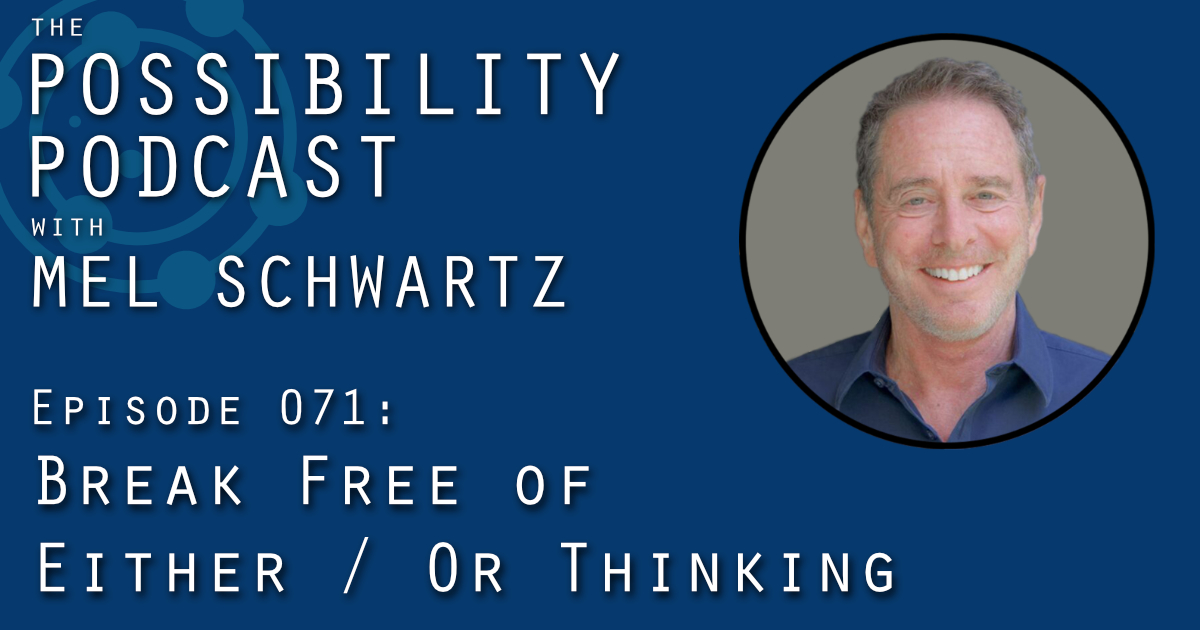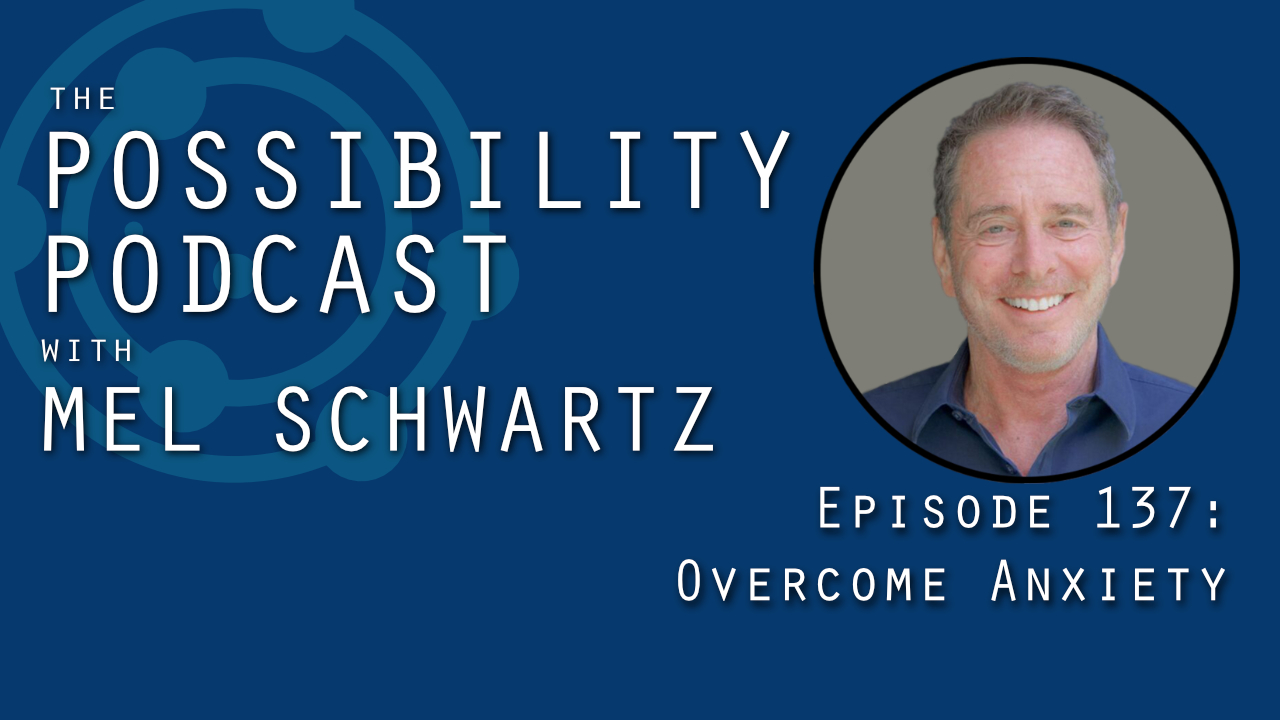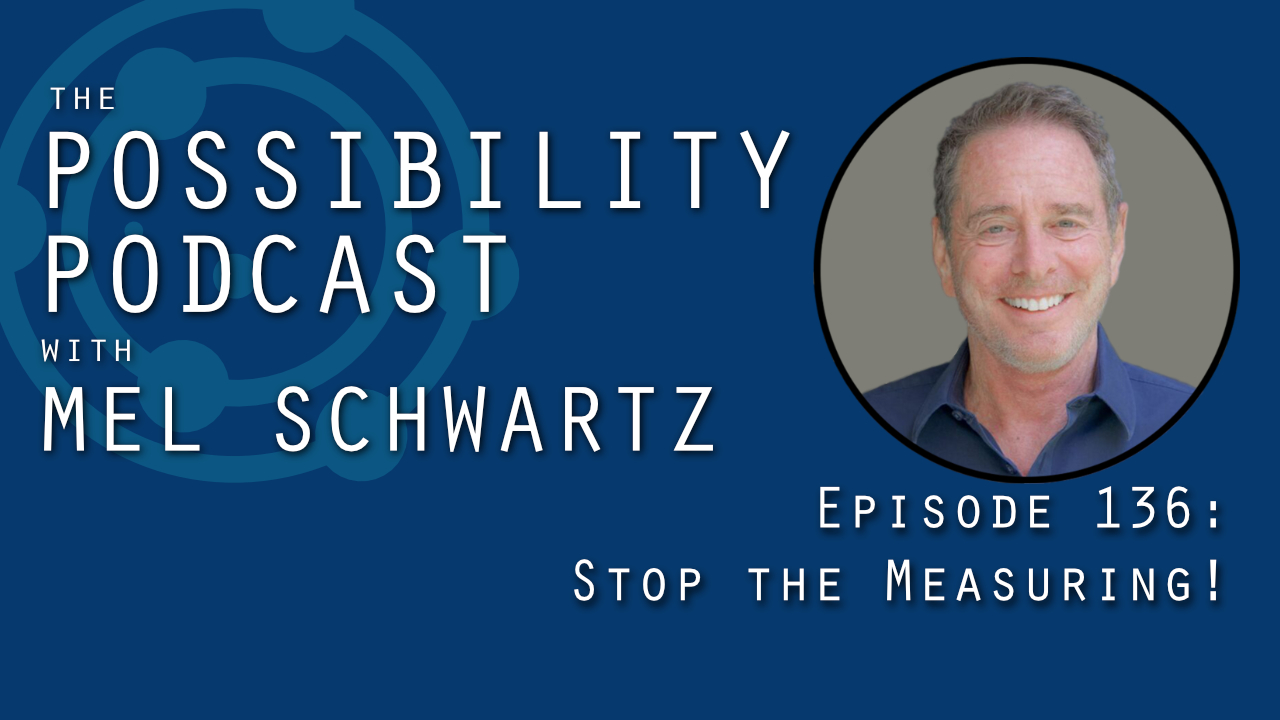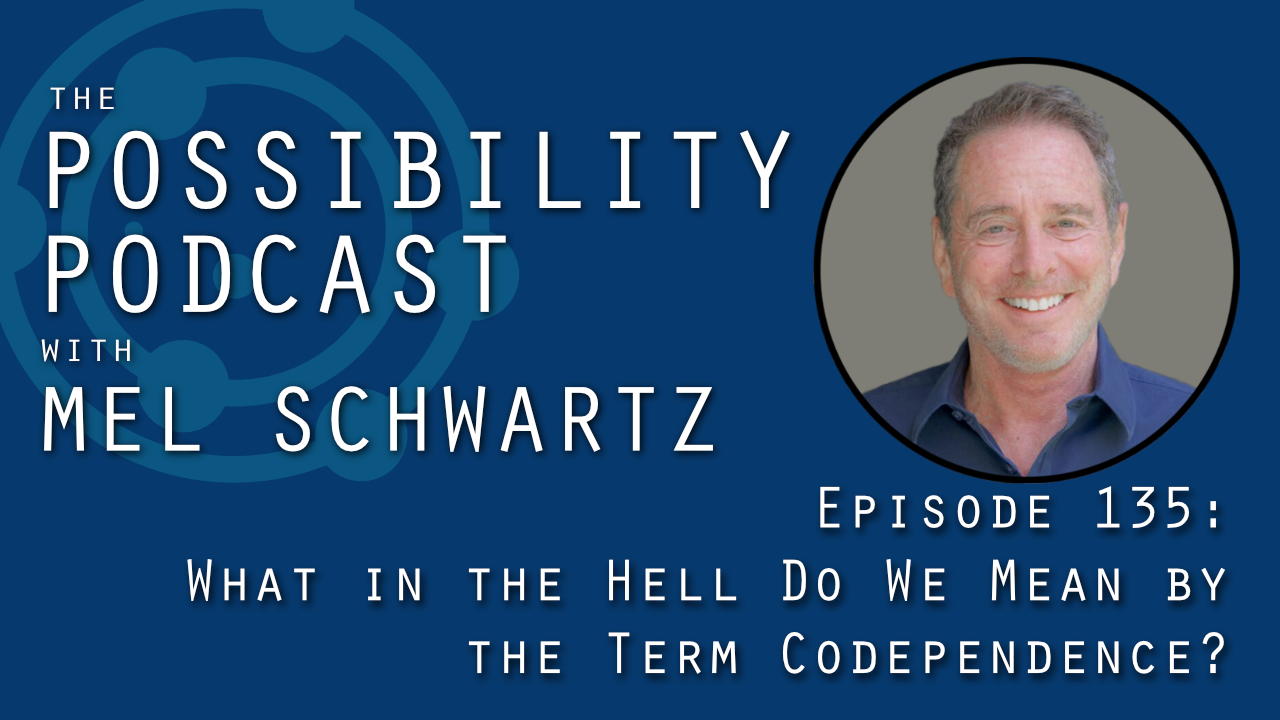Podcast: Play in new window | Download
Subscribe: RSS
Episode 071 of the Possibility Podcast with Mel Schwartz features an exploration of the tendency in this culture to dumb down our thinking and obscure complexity. This either / or thinking often leads to disaster in our relationships.
Listen to learn…
- …how the Included Middle gives us the space to embrace complexity
- …why reality is not compartmentalized into “this” and “that”
- …what you can do to avoid categorizing other people’s actions
- …how quantum physics offers us a model of reality with nuance and texture
In what ways might your life improve if you embrace complexity and reject either / or thinking? Let me know in the comments!
Want to watch this episode?
Transcript of The Possibility Podcast with Mel Schwartz #071
Hello everyone and welcome to today’s episode. We’re going to explore the nature of our thinking here, our tendency to dumb down our thinking and obscure complexity. It gets us into ruinous situations in our lives and our relationships and the world we live in. It’s about how to avoid this dumbing down of our thinking and engage new thinking with a rigor and a vitality that enables us to really thrive and break through and learn.
I’m calling it “Avoiding the trap of either / or thinking.” Let me explain to you what I mean by this. When I’m speaking with somebody I pay more attention to how they think than what they think. What am I saying here?
How we think is the filter through which we see, organize information, construct reality. What you think is the end product of it. Now our thinking, since the time of Aristotle, has been rooted in what’s called “either / or” thinking. Either / or thinking is “is this good, or is this bad? Do you agree with this, or do you disagree with it?” The questions that are posed to us create these compartments where reality is this way or it’s that way: either / or thinking. Um, if I’m right, that means you need to be wrong. Either / or thinking: we create separate compartments to our thoughts.
I’ve come across this very often. Obviously it’s my filter through which I see so I’m aware of it. I remember during the um, shortly after 9/11. President George Bush said, “You’re either with us or you’re against us;” created two separate compartments. We have to choose! Either way we organize reality sets these different compartments of reality. The concept of good wouldn’t exist without the concept of bad.
But there is this area that should be called the Included Middle. Different degrees — why do we have to organize our thought to go to this, or this, in two different extremes? Quantum physics has a notion called complementarity which is that opposing opposites exist. And that’s the way we organize reality.
But we do it to an extreme and we avoid what’s called the Included Middle. And this causes ruin to us.
Um, here’s another example: Often you still hear the argument, surprisingly or amazingly, about “is global warming, is climate change, caused by human behavior?” We get into the argument, “yes it is / no it isn’t.” That avoids the most important conversation. If a meteor was headed for a direct impact with planet earth and it would destroy life, would we be getting into an argument about “we didn’t cause the meteor, lets ignore it?”
When we limit ourselves to either / or thinking, we avoid complexity. Now when we avoid complexity, we dumb down. It is ruinous in our relationships with one another, with ourselves, with the environment, with everything!
Let me explain a bit more about what I’m referring to. The tendency is to choose category A or category B. When I am asked an either / or question, “Mel, do you agree with this or disagree? Mel, is this good or is this bad?” I have retrained my mind so I cannot answer an either / or question. I don’t want to because it’s created two separate constructions, two separate realities and I have to choose, like I’m on a game show, between one or the other.
But that’s not how reality operates. Reality is complex, it’s full of nuance and texture. Let’s look at relationships. In my work as a marriage counselor, as a couples therapist, or in my own life experience and engagement in relationships: when we default to right or wrong / yes or now, we lose the very heart, the vibrancy of what it is to be human, which is texture and complexity.
So as a culture, we have retreated so terribly to this dumbing down and choosing box a or box b. Actually, I remember taking tests where you had to choose multiple choice, A B C or D. I had a hard time because they were creating categories that were leaving out so much. We lose so much of what it is to be human and we then become trained to avoid complexity.
Complexity isn’t bad. Complexity is rich. Reality is complex. It is not oversimplified. The oversimplification of our thinking and our communication creates a bifurcation. Two different realms, and I have to choose between the two. Consciousness cannot prevail there. Insights and wisdom cannot prevail. And that’s oversimplification.
It’s ruinous to everything.
Here’s an example: I was asked, during an interview many years ago, this question: “So Mel, do we discover reality or do create reality?” I was being asked to choose. It was a false choice; a false option. I thought about it and I said, “Hm, I can’t answer that from the way you’re framing it. I believe that we discover reality and we create reality. They’re not illogically opposed to each other. Because when I create something, reality expands.”
When Einstein came up with the theory of relativity and it was confirmed empirically, scientifically, what he created is imagination created something that added to scientific knowledge. In that case he created it, he didn’t discover it. But also, what we discover is participating in what we create. They’re not separate categories.
In our human relations with each other, let me explain how ruinous this is.
The need to be right — separate categories, right and wrong — destroys and impedes the ability to check in to feelings. Now feelings are not right or wrong. Feelings should open us up to curiosity. Instead of saying “You’re wrong, I didn’t do that,” we need to move into someone else’s experience and ask, “How do you feel that way? I’m curious. I need to understand, I want to understand.” We need to embrace not knowing. We need to embrace confusion. Confusion is not a bad thing. We’ve been trained because of this dumbing down, this oversimplification, that it’s bad to be confused.
No. Nothing could be further from the truth. When I read or listen to a podcast, I want to experience confusion. I want to experience not knowing. Why?
Because when I can embrace that uncertainty and that not knowing, at a future moment in time, the cloudiness will part, I will have an insight, my understanding, my intelligence, my knowledge, will grow. It cannot do so through oversimplification.
Now, our thought, then, becomes trained to either or thinking, so we are trained, we are educated, we are acclimated, to avoid vulnerability of thought. Vulnerability of thought is confusion. not being certain, not knowing. Curiosity is not knowing. “I’m curious. I want to know; I want to understand.” We live again in this oversimplified culture, and truthfully, we’ve been doing it since the era of Aristotle, in which experts render their expert opinion.
Wouldn’t it be wonderful to hear a debate, or an expert on TV ask a question and embrace not knowing? Embrace complexity?
The great Supreme Court justice Oliver Wendall Holmes, ah, this quote is attributed to him; certain of the words may not be accurate and the language is arcane; he lived a long time ago. But he said, “I don’t give a darn for simplicity on this side of complexity. But I would give the world for simplicity on the other side of complexity.”
What did he mean? He meant opening up to not knowing, to not understanding, embracing the complexity, going through the process and then coming to clarity on the other side: that engagement of complexity is the engine of learning. It’s the engine of insight. Einstein didn’t come to his theories and insights by oversimplifying.
When we do that in our relationships, with ourselves and with others, we become ignorant. We’re no longer generative. Think to yourself when you’re asked an either / or questions, how you can reframe it and not default to these either / or categories.
When we can avoid the trap of either / or thinking — not surrender to checking this box or that box — we actually engage complexity. We’re no longer dumbing down.
Now what happens when we engage complexity? We move into the texture, the nuance, the complexity, the subjective realities — this is rich — this is where the dance of knowledge and insight comes from. But we can’t get there through a dumbing down. This is the vehicle for progress in our relationships and our curiosity to have wonder and curiosity. The thrill of not knowing, if you don’t judge yourself, allows you to navigate into new terrain — it’s exciting! It’s profoundly alive and present.
Let’s look at the debate in the United States over abortion. Are you pro-choice, yes or no? Well, I can be pro-choice, and yet I can be sensitive and compassionate to the feelings of people who feel differently, who believe in the right to life. We don’t have to draw battle lines. We need this included middle in our lives, in our relationship. Not the polar opposites. Emotions are complex. Emotions — sad, angry, confused, curious — they’re just words. They require the complexity of moving into it.
Now, sometimes people will say, “Well, I’m angry.” Greater complexity is that underneath anger is often fear. So if I’m angry, am I afraid? Am I insecure, do I feel at risk, do I explore the complexity of those feelings, and share them. Which would we be listened to and heard whereas anger is going to be shut down.
I read an article many years ago, I believe in the New York Times, and it was about the nature of concrete. That whe- before concrete becomes a solid state, it’s liquid. And if you keep that liquid vibrating, it doesn’t become solid, it doesn’t become concrete, it doesn’t become concretized. I try to do the same with my thinking. Which is if we can keep it vibrating, and to keep thought and relationships and communications vibrating requires curiosity, not default to right or wrong, dualistic, either / or thinking. If we can keep it vibrating, that’s not challenging. That’s alive. It’s vibrant. It’s engaged. It’s present.
What I mean by that is: being able to ask a new questions. How often have you thought to yourself, “I want to ask a new question of myself or others.” A new question brings us into absolutely new territory. The power of a new question is profound.
Or, when I’m asked a certain question, I might enquire, “Why did you ask me that question?” Questions prompt specific answers, they tend to fall into the dichotomy of either / or thinking.
Our cultural message is simple, it’s quicker, it’s better. Nobody has time for complexity. This may come to us from the media of TV, um, the value of the moment watching, advertising power, but it’s not a way to live our lives. We need to have wonder and curiosity and come out of these compartments and categories that we default to. Insight. Wisdom. Progress. Always comes from engaging complexity. Now let’s call that “either / and / or.”
Sometimes it sounds weird, I know — I may ask an either / and / or question. I won’t say, “Do you think it’s this, or do you think it’s that?” I might say, “Do you think this is due to this, and / or is it due to that?” That’s the included middle.
In twilight, it’s neither daytime nor nighttime. There is an included middle. I can be angry and feel vengeance and hate, and still feel love. Human nature is complex. When the mind can engage complexity and the heart can engage complexity, and stop defaulting to these either / or categories, we will come out of ignorance, we can thrive in our lives intellectually and emotionally and in terms of relationship.
Try it. Notice the either / or thinking; notice the either / or questions, and resist! Create a new category which is all-encompassing, and your life will really benefit from that shift.
Well I hope you enjoyed today’s conversation and episode, there’s so much more on this available to you; I look forward to speaking with you soon. Bye.
Subscribe to The Possibility Podcast with Mel Schwartz
Don’t miss a single Possibility Podcast with Mel Schwartz! Subscribe for free in iTunes / Apple Podcasts, Spotify, RadioPublic, Spreaker, or wherever you listen to podcasts. Or, simply copy / paste the RSS link directly into the podcast app of your choice!
Please Rate and Review
If you enjoy The Possibility Podcast with Mel Schwartz, please take a moment to rate and review the show in iTunes / Apple Podcasts or Podchaser. It only takes a few minutes, and adding your review is as easy as clicking this link.
Your rating and review helps raise the visibility of The Possibility Podcast with Mel Schwartz, especially on iTunes / Apple Podcasts, which is one of the biggest podcasting platforms today. More visibility for the show means more listeners… and that growth means the show reaches — and helps — more people like you.
Thank you!
Talk With Mel!
Help others when Mel helps you: Contact Mel and find out how you can be a caller on the show and ask Mel a question. He’ll put the Possibility Principle to work for you, and your conversation will be recorded for use in a future episode of the podcast so other listeners can benefit.





[…] Podcast 071: The Trap of Either/Or Thinking […]